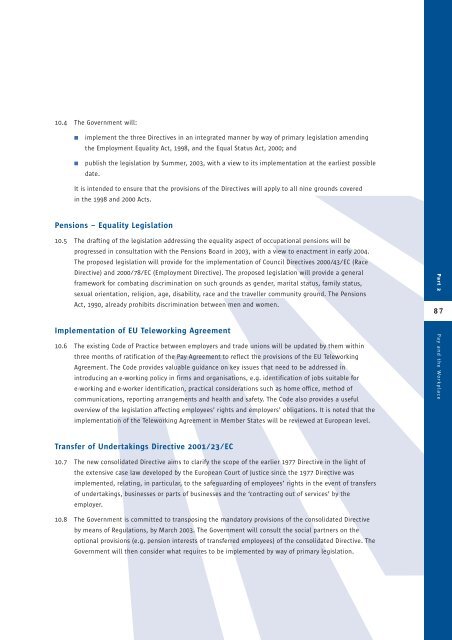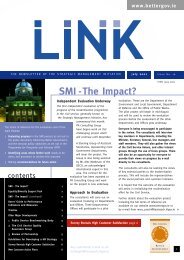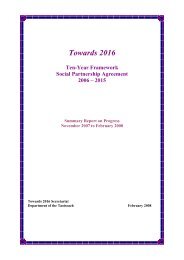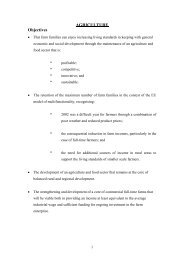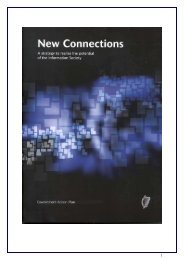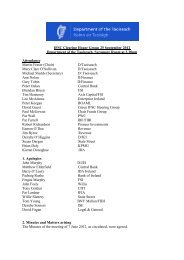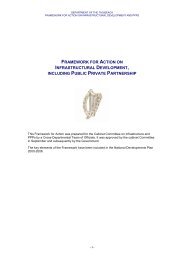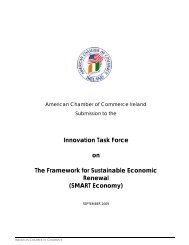Sustaining Progress - Department of Taoiseach
Sustaining Progress - Department of Taoiseach
Sustaining Progress - Department of Taoiseach
Create successful ePaper yourself
Turn your PDF publications into a flip-book with our unique Google optimized e-Paper software.
10.4 The Government will:<br />
■ implement the three Directives in an integrated manner by way <strong>of</strong> primary legislation amending<br />
the Employment Equality Act, 1998, and the Equal Status Act, 2000; and<br />
■ publish the legislation by Summer, 2003, with a view to its implementation at the earliest possible<br />
date.<br />
It is intended to ensure that the provisions <strong>of</strong> the Directives will apply to all nine grounds covered<br />
in the 1998 and 2000 Acts.<br />
Pensions – Equality Legislation<br />
10.5 The drafting <strong>of</strong> the legislation addressing the equality aspect <strong>of</strong> occupational pensions will be<br />
progressed in consultation with the Pensions Board in 2003, with a view to enactment in early 2004.<br />
The proposed legislation will provide for the implementation <strong>of</strong> Council Directives 2000/43/EC (Race<br />
Directive) and 2000/78/EC (Employment Directive). The proposed legislation will provide a general<br />
framework for combating discrimination on such grounds as gender, marital status, family status,<br />
sexual orientation, religion, age, disability, race and the traveller community ground. The Pensions<br />
Act, 1990, already prohibits discrimination between men and women.<br />
Implementation <strong>of</strong> EU Teleworking Agreement<br />
10.6 The existing Code <strong>of</strong> Practice between employers and trade unions will be updated by them within<br />
three months <strong>of</strong> ratification <strong>of</strong> the Pay Agreement to reflect the provisions <strong>of</strong> the EU Teleworking<br />
Agreement. The Code provides valuable guidance on key issues that need to be addressed in<br />
introducing an e-working policy in firms and organisations, e.g. identification <strong>of</strong> jobs suitable for<br />
e-working and e-worker identification, practical considerations such as home <strong>of</strong>fice, method <strong>of</strong><br />
communications, reporting arrangements and health and safety. The Code also provides a useful<br />
overview <strong>of</strong> the legislation affecting employees’ rights and employers’ obligations. It is noted that the<br />
implementation <strong>of</strong> the Teleworking Agreement in Member States will be reviewed at European level.<br />
Transfer <strong>of</strong> Undertakings Directive 2001/23/EC<br />
10.7 The new consolidated Directive aims to clarify the scope <strong>of</strong> the earlier 1977 Directive in the light <strong>of</strong><br />
the extensive case law developed by the European Court <strong>of</strong> Justice since the 1977 Directive was<br />
implemented, relating, in particular, to the safeguarding <strong>of</strong> employees’ rights in the event <strong>of</strong> transfers<br />
<strong>of</strong> undertakings, businesses or parts <strong>of</strong> businesses and the ‘contracting out <strong>of</strong> services’ by the<br />
employer.<br />
10.8 The Government is committed to transposing the mandatory provisions <strong>of</strong> the consolidated Directive<br />
by means <strong>of</strong> Regulations, by March 2003. The Government will consult the social partners on the<br />
optional provisions (e.g. pension interests <strong>of</strong> transferred employees) <strong>of</strong> the consolidated Directive. The<br />
Government will then consider what requires to be implemented by way <strong>of</strong> primary legislation.<br />
Part 2 Pay and the Workplace<br />
87


